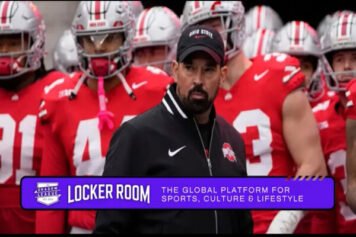Until November 2011, Joe Paterno and Penn State University were two of the most venerated institutions in all of sports. Referring to Paterno – a man – as an institution is no misnomer, either. The man held the all-time wins record for FBS coaches, led five teams to undefeated seasons and won two national championships. JoePa was also known as a man with a seemingly unwavering moral compass, managing to keep his PSU football program free from blemish for six decades. Nationally lionized, within the confines of his and the university’s hometown State College, JoePa was deified.
Paterno died Jan. 22, just a few months after former assistant coach Jerry Sandusky was arrested on 40 counts of child sexual abuse, sparking, perhaps, the most damning scandal in college sports history. Today, a man once worshipped like a god, lies in his grave while Nike CEO Phil Knight – and staunch Paterno supporter – removes Paterno’s name from the Joe Paterno Child Development Center in Beaverton, Ore. (home of Nike headquarters).
State College residents and PSU fans, students and faculty that formerly hyper-revered the coach are now wondering if Paterno’s name should be removed from the school library and if the university should take down Paterno’s statue outside Beaver Stadium.
Much of this is a reaction to the release of the Freeh Report. Former FBI director Louis Freeh and his investigative counsel (a team that had extensive legal, law enforcement and child protection backgrounds) were commissioned by the PSU Board of Trustees to investigate what failures, climate and negligence could have accommodated a repeated child abuser like Sandusky to freely walk State College campus – even raping young children in University facilities.
After conducting, according to the report, over 430 interviews and examining more than 3.5 million pieces of electronic data and documents, the Freeh counsel issued a 267 page report, concluding that “the most saddening finding is the total and consistent disregard by the most senior leaders at Penn State for the safety and welfare of Sandusky’s child victims.”
The report went on to claim that “four of the most powerful people” at PSU – president Graham B. Spanier, senior vice president Gary C. Schultz, athletic director Timothy Curley and Paterno – “failed to protect against a child sexual predator harming children for over a decade.”
Aware of Sandusky’s child sexual abuse incident in 1998, the predator was still given unfettered access to PSU campus up and until his arrest in 2011. The report asserts the obvious: “that continued access provided Sandusky with the very currency that enabled him to attract his victims.”
Spanier was forced to resign from his position in November. Schultz and Curley have been indicted for perjury. Sandusky was recently found guilty on 45 charges and will likely spend the rest of his life in prison. Paterno is dead; his legacy’s deteriorating like a sugar cube in hot coffee.
In the wake of the report, we now have a university that is now the preeminent example of two things – the intense human inclination for some (maybe even many) to almost violently protect and preserve power; and the cultish climate created by the outsized stature of big time athletics in small town America.
It wasn’t just negligence and misjudgment that allowed Sandusky to terrorize kids on PSU campus for over a decade. The Freeh report details a lack of empathy and proactive self-service among the university’s powerful officials that can only imply that self-preservation was of paramount importance. For example, none of these men even sought to identify Victim 2 – the child Mike McQueary witnessed Sandusky assaulting in the Lasch Building shower in 2001 – to inquire about the child’s well-being.
These were wealthy men, in positions of rare power, presiding over one the most prestigious academic universities and athletic programs in the country. Many human’s appetites for power can range anywhere from healthy to practically carnal. Once we get it, if we don’t police it, the possession of power and desire to keep it can often corrupt one’s moral code. Power – getting and maintaining it – is at the root of this country’s and history’s darkest actions and secrets. Otherwise unthinkable acts are committed and the well-being of others put in otherwise unthinkable danger as power-preservation and, ultimately, self-preservation takes over. That’s the only way to explain typically good men mishandling the Sandusky situation in such a callous manner and for so long.
And then there’s the issue of college athletics on college campuses and the engendered climate/culture. The Freeh report spoke of “a culture of reverence for the football program that is ingrained at all levels of the campus community,” and an “excessive focus on athletics.”
Cloistered off in rural State College, this produces a very insular culture and protocol. It’s known as “The Penn State Way,” which, in addition to PSU’s Nittany Lions obsession, the report finds (and this is no revelation) that there’s an over-emphasis on a PSU-idea of decision-making and a resistance to seeking outside perspectives. So, it goes, no matter the nature of the crime/problem, try to handle everything in-house and, at all cost, protect the football program. That’s how a Sandusky can stalk around a campus with kids in 2011 after having first been investigated for inappropriate conduct with a minor in 1998.
Penn State is the most cautionary of cautionary tales because, given human inclination when it comes to power and the warped cult-culture football has created on many other college campuses, there’s no telling what dark secrets lurk uncovered elsewhere.
In response to the Freeh Report, Paterno’s family issued a statement. “The idea that any sane, responsible adult would knowingly cover up for a child predator is impossible to accept,” they wrote. “The far more realistic conclusion is that many people didn't fully understand what was happening and underestimated or misinterpreted events.”
In the Paternos’ idealistic world, that statement could be true. It’s far more likely, however, that it is merely a family’s quaint, love-blinded attempt to protect what’s left of the reputation of a hero rapidly falling from grace.
But, one of these days, that JoePa statue is bound to come down.
“If Penn State University has any courage, any character, or any integrity,” wrote a fan on Midwest Sports Fan. “The statue of Joe Paterno outside of Beaver Stadium will be brought down and put away, never to be seen again.”
It will be a difficult decision, one of many small attempts to make right all the wrong that came from powerful men taking the easy way out.



